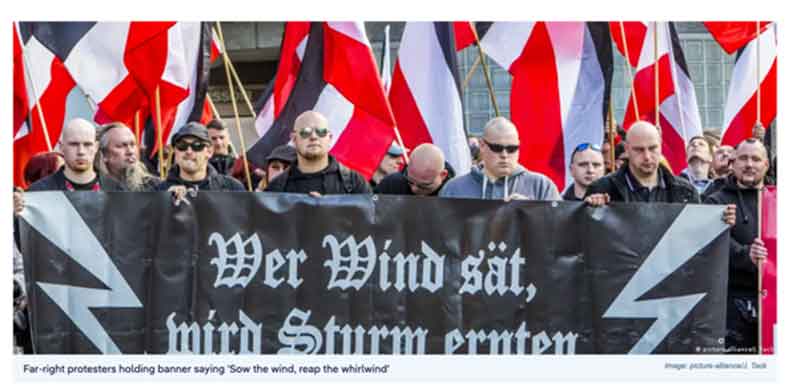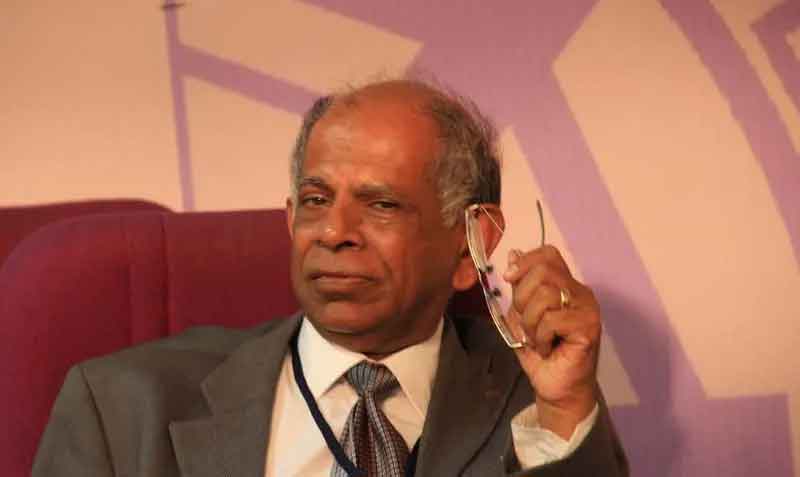by Thomas Klikauer and Danny Antonelli

Screenshot: German Public TV https://www.dw.com/en/german-authorities-to-expand-crackdown-on-right-wing-extremists/a-50833344
Right-wing extremism is on the march almost everywhere in Europe. As Lenin once said: Fascism is capitalism in decay. So “What is to be done? How can we fight far-right extremism, in particular Germany’s most prominent neofascist political party the right-wing extremist AfD?
By early June 2024, and according to Germany’s so-called Sunday-Question, the AfD is still receiving between 16% and 18% of public support. The European parliamentary elections – from 6 to 9 June 2024 – has dismayed many observers, scholars, public intellectuals, journalists and – most importantly – democratic parties, due to the AfD’s recent poll ratings.
Most depressing however is that support for the AfD in the former East-Germany is between 15% and a whopping 31% – depending on individual states. Recent mass rallies against the AfD seem to have had only a limited impact.
Nobody appears to have a remedy. Still, from recent research on the far-right there are some very clear indications about what to do. What we have known for a long time is that populist parties and far-right politicians succeed in “turbulent times” – whether real or conjured up by far-right propaganda.
Claiming that “we live in turbulent times” is a rather empty phrase and unhelpful toward understanding and combating the right.
Of course there are always plenty of reasons to claim “turbulent times”: demographic and technological change, the uncertain future, fluctuation in the global economic order, migration and, of course, the most defining issue of our age, global warming.
There is one key reason above all that pushes the agenda of the far right and adjacent right-wing populists. They are extremely good in pretending to offer a ostensibly simple answers to complex questions. These are coded messages, dog-whistles, that are always wheeled out in order to get the base riled up.
The all-encompassing standard answer offered by right-wing populists to every question facing society is always the same: “Others are to blame.” The “others” means immigrants as well as “globalists” as well as the nonsensical purely antisemitic Jewish world conspiracy.
In the hallucinating imagination of right-wing populists the – never really defined – “elites” are believed to have entered into an unholy alliance with a parasitic lower class.
In their twisted mindset, both are never attributable to “das Volk” which, in the mindset of the far-right, always has a white-Aryan element simmering in the background. This is currently made appealing through the right-wing ideology of Ethnocentrism.
Right-wing populism lives from an invented dichotomy. More simplification is not possible: us vs. them, migrants vs. Germans, good vs. evil, in-group vs. out-group, friends vs. the enemy, etc. Years of hammering such far-right ideologies into the public sphere in Germany has not yet resulted in splitting Germany into two parts, like what is happening in the USA.
In fact, Germany is not breaking apart into neofascists vs. democrats because millions of people of various political orientations have been united in rallying throughout the country against a rather small group of neo-fascists, as is currently evident everywhere on German streets.
However, there is also a structural similarity between neoliberalism and right-wing populism. Both ideologies assume there exists (or they seek to create) a world consisting of two opposite parts. In the mythology of right-wing populism, these are two parts of one society – the “decadent elite” vs. the “good people”.
Meanwhile, the ideologues of neoliberal market fundamentalism take the position that there are two opposite economic and social orders – the “free” market vs. the “regulated” market, with nothing in between.
In Germany, many people currently see both the FDP and the AfD in terms of their economic agendas, especially since the neofascist AfD represents radically neoliberal positions. One of Germany’s most powerful pro-capitalism lobby institutions – the DIW (German Institute for Economic Research) – said: “vote AfD and lose!”.
The neoliberal ideological obsession of the AfD is seen from its frequent use of “planned economy” as a curse. Even the slightest attempt to regulate capitalism is cursed.
Common among Trump-Republicans, among Germany’s conservatives (CDU) and the outspoken neoliberal FDP, virtually any form of regulation that does not suit its oligarchic business class clientele is framed as a “planned economy” that is calculated to elicit negative comparisons with Soviet 5-year plans of the Cold War past.
Meanwhile, in the USA, the billionaire Koch brothers-financed Tea Party and its ideological successors in the Trump-Republican Party have been saying this for about the last 15 years. Even universal health insurance – which all other OECD countries have – is considered “socialism” by many in Trump’s MAGA camp.
Back in Germany, the AfD’s ideology is marked by the same dichotomy. It becomes very clear in the use of the two terms of “Altparteien” (old parties, framed as outdated and obsolete) and “linksgrün” (progressive environmentalism which is hated by Germany’s far-right). For the far-right AfD, this always means “us” against “them”.
The fact that the phrase “left-green” has long been used by the neoliberal FDP and the conservative CDU is a homage to the AfD’s successful rise. Its populist oversimplifications are working.
Meanwhile, factions in the CDU conservatives and the neoliberal FDP still believe in the existence of a “bourgeois camp” [bürgerliche Mitte] – to which they claim to belong. This “bourgeois middle class” is set clearly against the proletarian working class.
To which camp do AfD voters belong? The party should not really be resonating with the bourgeois centre or the real working class. But are they starting to capture these two groups and draw them toward the far-right?
The neat horse-shoe-like dichotomy described by Jean-Pierre Faye is, if one gives it a moment of clear thought, an absurdity.
The actual composition of the electorate spanning from the environmentalist Greens to the social-democratic SPD and to the semi-socialist Left [die Linke] is more like traveling on a train through various mixed neighborhoods where one or the other way of thinking is in a slight majority.
Of course, virtually all of these political parties have many bourgeois – if not petty bourgeois – voters. In any case, simple dichotomies as presented by Germany’s conservatives (CDU), neoliberals (FDP), and the far-right (AfD) are always wrong in a complex world. Overall however, two key lessons emerge from this:
- All of Germany’s democratic parties must consistently oppose the AfD’s misleading simplifications and dichotomies.
- Far-right populists win when others adopt their positions and interpret the world in the framework of right-wing populism.
This also applies to the crude attacks of Germany’s far-right and the AfD on democratic political parties. Immigrants are not “the problem” and they are not the reason for all the troubles German society faces.
This supposedly simple right-wing populist answer is not only misleading, it lacks any basis in logical reality.
This was impressively illustrated by the Correctiv research on the depopulation plans of German right-wing extremists as voiced during their now-infamous gathering in Potsdam.
The AfD and far-right deportation fantasies – which aren’t mere utopian thinking exercises in right-wing extremist circles – are both inhumane and irrational. A quarter of the German population has a background which includes migration. If they were to be deported, the German economy would collapse almost instantly.
If right-wing extremists prevail with their racist nightmare policies, the country – including BMW, Siemens, Mercedes-Benz, Volkswagen, hospitals, schools, universities, most public utilities, etc. – will implode. Racism is neither a morally justifiable nor an economically feasible position.
But it has an emotional, fear-inducing element that works on people with low self-esteem and therefore it is pushed by the AfD.
In any case, despite the irrational misbelief and and racist hallucination which permeates the AfD and Germany’s far-right, there has never been nor will there ever be an “Aryan” Germany.
Another way to fight against the AfD and the far-right is to make sure that all democratic parties always frame racist positions and arguments as dangerous nonsense. Unfortunately, there is a dark tradition among German conservatives (CDU) which does not adhere to this art of framing.
For example, there was CDU talk of Children instead of Indians, as well as the CDU’s Roland Koch and his ugly, racist, but election-winning campaign against young people with a migrant background.
And today? CDU-boss Friedrich Merz spoke of the “little pashas”. Merz also suggested that refugees will prevent Germans from getting a dentist appointment. Meanwhile, his conservative sidekick Markus Söder (CSU Minister-President of Bavaria since 2018) talked about “asylum tourism”.
It has been proven many times over that adopting a right-wing populist position only ever benefits the far-right populists. Strategies that copycat right-wing populism will not reduce support for right-wing radicals – on the contrary.
What helps, on the other hand, is a “cordon sanitaire”. This, roughly, corresponds to the German term of “firewall” or Brandmauer.
Much of the election rhetoric of Friedrich Merz, Markus Söder and others is – in sound and style – the rhetoric of the far-right AfD. If democratic parties adopt the themes, issues, agendas and ideologies of far-right populist parties, only the latter will benefit.
The technical term for this is “issue ownership”. Topics such as “rejecting migration and immigrants” and “blunt hatred of Germany’s Greens” are core topics of the AfD. It is therefore a fatal mistake for German conservatives to say they are distinct from the AfD when it is clear that they are not distinct with regard to their issues.
It is also a mistake for conservatives to want an “alliance of the centre” – not against the AfD – but against migration. With such a strategy, the AfD sets the agenda for the centre. It is AfD policy support by default.
This is not going to work. Germany’s conservatives – Jens Spahn, Markus Söder and Friedrich Merz – have deliberately (and faithfully) turned the issue of migration into a big issue. This will benefit the AfD and actually siphon off conservative voters from the parties that so badly want them.
In other words, German conservatives operate a kind of “agenda setting” in favor of the AfD. This is a severe mistake. Increased media attention for topics (e.g. migration) belonging to that party (the AfD) increases support for the topic owned by that party (the AfD). In short, the conservatives’ strategy to focus on AfD issues will only help the AfD.
So, a third effective measure against the AfD is to make mandatory that all democratic parties must stop supporting any agenda items espoused by the AfD. This is especially true for the constant problematization of migration. This doesn’t mean that one cannot speak about topics such as societal integration policies.
Instead of implicitly or explicitly supporting the AfD’s anti-migrant agenda, one might focus on showing support for local municipalities that help new migrants, or support the upgrading of Germany’s education system to better assist recent migrants.
One can also fight the AfD and their racist agenda, by, for example, exposing the AfD’s agenda for what it is: a hodgepodge of racist declarations by charlatans who have been caught lying again and again.
The AfD – if they ever come to power – will massively harm their own electorate as even the pro-business DIW research has shown.
A fourth measure against the AfD consists of all democratic parties putting the implausibility, hypocrisy, the lies and charlatanism of the AfD at the centre of their talking points.
There should also be much more said about the economic delusions of the AfD and about the real consequences of their irrational racism.
In an interesting field experiment that took place in Italy in 2020, it turned out that an effective way to combat populist voting behavior is to attack the credibility of populists. In Germany, the 2024 Correctiv report was a good example.
The public saw and experienced real right-wing extremists talking among themselves about their true desires. Although such deeply racist positions have been formulated by the AfD and other right-wing extremists in public and for some time, this very personal experience has triggered disgust among many people and it has done so even in Germany’s corporate circles.
A fifth effective measure is not only a task for individual parties but for the whole of society. For associations, clubs, churches and every individual it must be made clear at every opportunity that social ostracism will be the result for anyone agreeing to the positions of the AfD and other right-wing extremists. An unpleasant experience must be the result if one is caught spreading far-right ideas.
What has been happening in German in cities and towns since the beginning of 2024, shows that this measure, especially, can be effectively achieved. In cities like Hamburg, the AfD and radical right-wingers do not reveal themselves in public, even their election posters are rarely seen, and if, then rarely seen intact.
Thomas Klikauer is the author of German Conspiracy Fantasies – out now on Amazon! Danny Antonelli grew up in the USA, now lives in Hamburg, Germany and writes radio plays, stories and is a professional lyricist and librettist.
















































